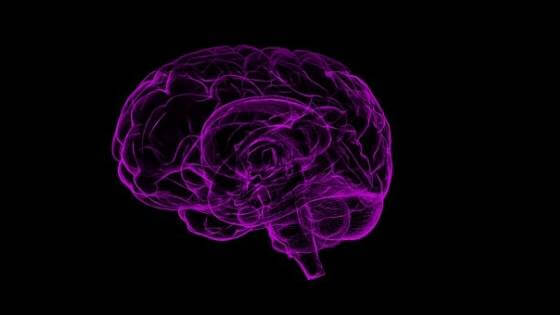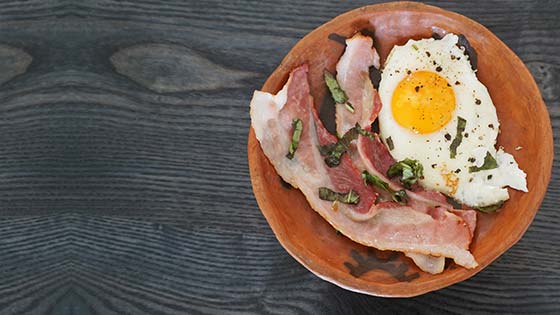Let’s get into some reasons why you’re not losing weight on keto, shall we?
1. You’re Eating Too Many Carbs
One good reason you’re not losing weight on keto might be because you’re eating too many carbs.
Getting into ketosis requires you to deplete your body from its glycogen stores (carbs).
If you’re eating too many carbs, your body won’t be able to empty your glycogen stores and break down fat into ketones for energy.
Here are 8 tips to help you get into ketosis fast.
How Many Carbs Should I Eat on Keto?
During the keto diet, your carb intake should remain between 5-10% of your daily total calorie requirements. (1)
For example, if you have to eat 2000 calories per day, 100-200 of those calories should come from carbs.
With 1 gram of carbs being about 4 calories, a person eating 2000 calories per day should eat between 25 – 50 grams of carbs.
Adjusting to such little carbs can be tough if you’re just starting out, so don’t beat yourself up if you don’t get it right away.
It takes time to build new habits.
Here’s a complete keto diet guide for beginners you can explore.
TAKEAWAY
Carb intake should be kept between 5-10% of your total daily calories. Some people might get away with a little more.
2. You’re Eating Too Much Protein
Protein is an essential nutrient that most people don’t get enough of.
Not only is protein digested slowly, which helps you stay full for longer, but also has a high thermic effect. This means that your body burns more calories just by trying to digest it. (2)
However, some people can end up eating too much protein.
Eating more protein than your body needs can kick you out of ketosis.
This happens because your liver can turn certain amino acids from protein into glucose. (3) And if there’s glucose in your body, it will be used before fat.
How Much Protein Should I Eat on Keto?
Try keeping your protein intake between 15-25% of your total daily calories, or 0.7-0.9 grams of protein per pound of body weight.
Check out these 7 best keto protein powders for weight loss.
TAKEAWAY
Protein intake should be kept between 15-25% of your daily calories. Too much protein can kick you out of ketosis.
Lose your first 5-10 pounds in just 1 week.
Get the FREE 7-Day Keto Challenge!

3. Not Eating Enough Fats
Another reason you’re not losing weight on keto might be because your fat intake is too low.
Some people think that reducing fats on the keto diet will make them healthier, which is a big mistake.
When you reduce a macronutrient from your diet, you must replace it with another so that you don’t end up drastically cutting your calories and slowing your metabolism too fast.
There’s no need to fear a high fat intake, as long as you eat healthy fats and limit trans fats, you’ll be okay.
How Much Fat Should I Eat on Keto?
If you’re on the keto diet, you should bump your fat intake to about 70% of your total daily calories.
If you’re having trouble getting enough fat in your diet, including a high-quality MCT oil into your diet might make it easier for you.
You can add it to almost every meal or drink for an extra boost in fats.
Another great option for drinks and smoothies is adding an MCT Creamer, this adds some flavor and creamy texture to them without the oily feel.
TAKEAWAY
Fat intake should be around 70% of your daily calories. If you’re having trouble getting enough fat, adding MCT oils might help.
4. You’re Not Eating Nutrient-Dense Foods
Eating keto doesn’t mean you can eat whatever you want as long as you don’t eat carbs.
When doing keto, you should still focus on getting most of your calories from nutrient-dense/whole foods.
Eating too many foods like keto-friendly protein bars or desserts can add up unwanted calories and lead to weight gain.
They may also contain hidden sugars, trans fats, and preservatives even when marketed as “keto” or “low-carb.”
Processed foods tend to be high in calories but low in vitamins, minerals, and antioxidants, which can lead to health issues in the long-term.
Plus, they can be expensive, which can be a problem if you’re trying to eat keto on a budget.
Make sure to add low-carb vegetables like spinach, broccoli, asparagus, and peppers to ensure that you get enough fiber and nutrients.
TAKEAWAY
When following keto, you must still pay attention to food quality. Focus on getting at least 80% of your calories from whole foods.
5. Eating Too Many Calories
Another reason you’re not losing weight on keto could be eating too many calories.
While many things, such as your metabolism, genetics, and health conditions can affect weight loss, “calories in vs. calories out” it’s still the main driver.
If you’re eating more calories than you burn, you’ll simply store fat and gain weight, even on keto.
While it’s difficult to overeat on keto since fats and protein are very filling nutrients, it’s still possible.
Keep in mind that 1 gram of fat contains 9 calories as compared to 4 calories per gram of carbs and protein. So it’s important to not overindulge in healthy fats.
Here’s an article that goes over how long it takes to see results on keto.
TAKEAWAY
During keto, you still need to be in a calorie deficit in order to lose weight.
6. Constantly Snacking
Overlooking snacks is a common mistake people trying to lose weight make.
They think a “little” snack won’t affect much, but they often add up in calories when eaten throughout the day.
So be mindful of the things you eat throughout the day.
TAKEAWAY
Most snacks are not filling, which makes them easy to overeat. Be careful when snacking during keto.
7. Eating Maltitol
Sugar alcohols can be a great option if you’re on keto but want to add some sweetness into your diet. However, not all sugar alcohols are keto-friendly.
Maltitol is one of those that aren’t good for keto.
While it is technically a low glycemic index (GI) sugar, it still affects your blood sugar levels, which can kick you out of ketosis.
TAKEAWAY
Not every sugar alcohol is keto-friendly. Watch out for Maltitol.
8. High Stress
Studies (4) have shown that high stress levels can prevent you from losing weight on keto.
This happens because stress can cause hormonal alterations that lead to increased hunger and cravings, making it easier to overeat and gain weight.
TAKEAWAY
High stress can affect your rate of weight loss.
9. Unrealistic Weight Loss Expectations
You’ve probably heard people say they’ve lost over 10 pounds in their first week of keto. However, most of that weight loss comes from water.
This happens because 1 gram of glycogen holds about 2-3 grams of water. (5)
After eliminating carbs from your diet, your body will use its glycogen stores for energy, and once it runs out of glycogen, the water will also leave.
After that initial weight drop, your rate of weight loss becomes more realistic and steady.
Recommended Rate of Weight Loss
It’s recommended to lose about 1% of your body weight per week to maintain muscle mass and a healthy metabolism. For most people, this is about 2 pounds per week. (6)
However, if you’re overweight or obese, you can lose up to 1.5-2% of your body weight per week.
If you’re overweight or obese, you likely have enough fat stored to get energy from without compromising muscle mass.
For example, if you’re 200 pounds and overweight, you can safely lose 4-5 pounds per week.
TAKEAWAY
Aim to lose about 1% of your body weight per week. If you’re considered overweight or obese, you can lose up to 1.5-2% of your body weight per week.
10. You’re New To Resistance Training
If you just started keto, as well as a new workout routine, you might be gaining muscle mass while losing body fat.
This might lead to changes in how your body looks, but not the scale. For example, you may have lost 1 pound of fat, but gained 1 pound of muscle.
That’s why it’s important to track your progress by taking weekly photos and measurements rather than only focusing on the scale.
TAKEAWAY
Resistance training might be making you gain muscle while losing fat, which can make the number on the scale no change.
11. Underlying Health Conditions
If you’re having trouble losing weight on keto even though you’re following it properly, you might want to check for some medical issues that may be slowing down your progress.
For example, conditions like hypothyroidism, polycystic ovarian syndrome (PCOS), high insulin levels, and depression can make weight loss a little more difficult.
However, with proper medication and lifestyle changes you can still lose weight. Consult with your doctor to rule out any underlying medical condition if you’re having trouble losing weight.
TAKEAWAY
A few health conditions can make it difficult to lose weight. Speak to your doctor to rule out any underlying health condition.
12. Not Exercising
While exercising is not required for weight loss, it can surely be of great help.
Exercising will help you keep your metabolism running fast and help you burn more calories as well as give you many health benefits.
Exercising can lower the risk of chronic diseases, such as diabetes, depression, heart problems, and anxiety.
When exercising, you may want to go for an activity you enjoy as it will help you stick with it longer.
Remember, when losing weight you want to focus on long-term sustainability instead of short-term satisfaction.
If you loved these 12 reasons why you’re not losing weight on keto and are ready to start your weight loss journey, the Custom Keto Diet plan is the place to start!

This plan helps men and women lose fat without starving themselves or giving up their favorite foods.





